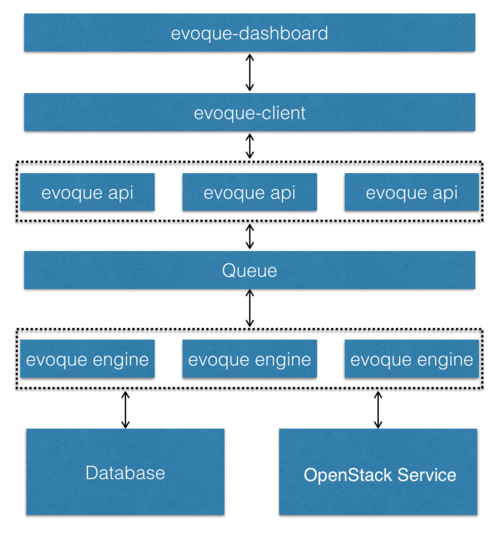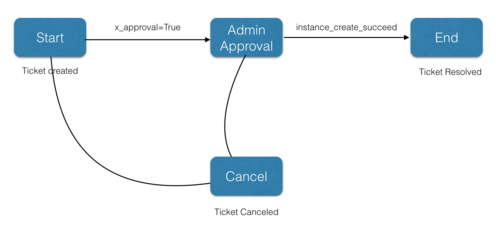Difference between revisions of "Evoque"
(Created page with "== What is Evoque? == Evoque is a ticket service for OpenStack. == Use cases == == Rationale == == Terminology & Workflow Model == == Links & IRC == * Project at Launchpa...") |
Einst Crazy (talk | contribs) (→Architecture) |
||
| (14 intermediate revisions by 3 users not shown) | |||
| Line 2: | Line 2: | ||
Evoque is a ticket service for OpenStack. | Evoque is a ticket service for OpenStack. | ||
| + | |||
| + | |||
| + | === Architecture === | ||
| + | |||
| + | The following picture depicts the high-level system architecture of the Evoque service: | ||
| + | |||
| + | [[File:Evoque-architecture001.png|500px]] | ||
| + | |||
| + | The main components in the picture are: | ||
| + | * The ''evoque-dashboard'' component provider UI for Evoque service; | ||
| + | * The ''evoque-client'' component provides the command line interface (CLI) for users to interact with the Evoque service; | ||
| + | * The ''evoque-api'' service provides the RESTful APIs for the ''evoqueclient'' component or other services; | ||
| + | * The ''evoque-engine'' service sits behind the ''evoque-api'' service and operates on the tickets/workflows; | ||
== Use cases == | == Use cases == | ||
| + | |||
| + | === Issue Tracking Management === | ||
| + | An end-user is able to use Evoque to create and track issues happened within the cloud. Issues can be anything describable and happen at the customer's side, for example, the VM is disconnected from Internet, the router is disabled by incident, etc. When the end-user creates an issue (or a ticket), Evoque submits the request directly to the right service teams that have corresponding role- or group-based read or write permissions, which is defined by the cloud admin. Each issue (or a ticket) has a clearly identifiable ticket number, and each follow-up notification is assigned to the original ticket and permanently archived in an audit-proof manner. Freely configurable response templates, auto-responses and text modules can be created and edited easily with the WYSIWYG editor inside Evoque. Besides, it is possible to enclose attachments, like screen snapshots, if needed. | ||
| + | |||
| + | === Customer Information Center === | ||
| + | An end-user is able to use Evoque to manage all the happened or on-going issues in a central portal provided by Evoque. It allows end-users to easily check the current status of their requests and the history of their requests as well. Users of a customer company can also see other IT requests that have been created by their colleagues, thus preventing repetitive user reports about the same incident, only if the right permission is assigned to the tickets. | ||
| + | |||
| + | === Incident and Request Fulfillment Management === | ||
| + | The IT service team is able to use Evoque to manage all the incoming tickets submitted by their customers. All the tickets are initially classified in advance and assigned to a given service representative. Ticket workflow can also be defined and processed linearly by the service team, allowing ticket delegation and reassignment. The process of dealing with a ticket is recorded along with the metadata of the ticket for audit. Evoque also offers highly sophisticated reporting functions to report the current status and the historical data about all the activities. | ||
| + | |||
| + | ==Development (Blueprints, Roadmap, Design...)== | ||
| + | * [https://blueprints.launchpad.net/evoque Blueprints] | ||
| + | * [[Evoque/Roadmap|Roadmap]] | ||
| + | * [[Evoque/Design|Design]] | ||
== Rationale == | == Rationale == | ||
| − | == Terminology | + | == Terminology== |
| + | ===== Workflow ===== | ||
| + | Workflow Diagram | ||
| + | |||
| + | [[file:Evoque-workflow-example1.png|500px]] | ||
== Links & IRC == | == Links & IRC == | ||
* Project at Launchpad: http://launchpad.net/evoque | * Project at Launchpad: http://launchpad.net/evoque | ||
| − | * | + | * You can also attend our regular IRC meetings on the same <code><nowiki>#openstack-meeting-alt</nowiki></code> channel: http://wiki.openstack.org/Evoque/Meetings |
| − | * IRC channel for regular daily discussions: #openstack-evoque | + | * IRC channel for regular daily discussions: <code><nowiki>#openstack-evoque</nowiki></code> |
== Team == | == Team == | ||
Latest revision as of 02:32, 28 November 2015
Contents
What is Evoque?
Evoque is a ticket service for OpenStack.
Architecture
The following picture depicts the high-level system architecture of the Evoque service:
The main components in the picture are:
- The evoque-dashboard component provider UI for Evoque service;
- The evoque-client component provides the command line interface (CLI) for users to interact with the Evoque service;
- The evoque-api service provides the RESTful APIs for the evoqueclient component or other services;
- The evoque-engine service sits behind the evoque-api service and operates on the tickets/workflows;
Use cases
Issue Tracking Management
An end-user is able to use Evoque to create and track issues happened within the cloud. Issues can be anything describable and happen at the customer's side, for example, the VM is disconnected from Internet, the router is disabled by incident, etc. When the end-user creates an issue (or a ticket), Evoque submits the request directly to the right service teams that have corresponding role- or group-based read or write permissions, which is defined by the cloud admin. Each issue (or a ticket) has a clearly identifiable ticket number, and each follow-up notification is assigned to the original ticket and permanently archived in an audit-proof manner. Freely configurable response templates, auto-responses and text modules can be created and edited easily with the WYSIWYG editor inside Evoque. Besides, it is possible to enclose attachments, like screen snapshots, if needed.
Customer Information Center
An end-user is able to use Evoque to manage all the happened or on-going issues in a central portal provided by Evoque. It allows end-users to easily check the current status of their requests and the history of their requests as well. Users of a customer company can also see other IT requests that have been created by their colleagues, thus preventing repetitive user reports about the same incident, only if the right permission is assigned to the tickets.
Incident and Request Fulfillment Management
The IT service team is able to use Evoque to manage all the incoming tickets submitted by their customers. All the tickets are initially classified in advance and assigned to a given service representative. Ticket workflow can also be defined and processed linearly by the service team, allowing ticket delegation and reassignment. The process of dealing with a ticket is recorded along with the metadata of the ticket for audit. Evoque also offers highly sophisticated reporting functions to report the current status and the historical data about all the activities.
Development (Blueprints, Roadmap, Design...)
Rationale
Terminology
Workflow
Workflow Diagram
Links & IRC
- Project at Launchpad: http://launchpad.net/evoque
- You can also attend our regular IRC meetings on the same
#openstack-meeting-altchannel: http://wiki.openstack.org/Evoque/Meetings - IRC channel for regular daily discussions:
#openstack-evoque


